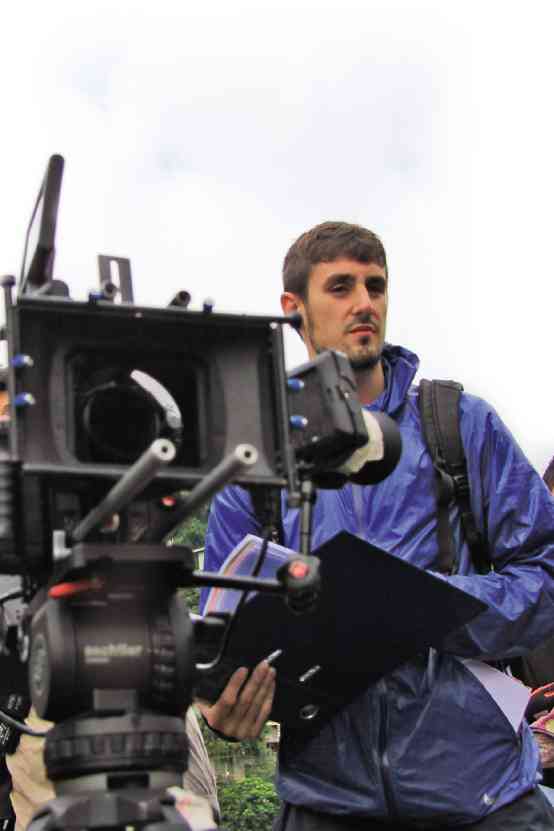
ROBERT D. Martin is proud of his international crew, composed of individuals from the Philippines, US, France, Mexico, India and Puerto Rico. GEOFREY NAWE
It started with an invitation that sounded more like a dare.
Robert D. Martin, originally from Minneapolis, Minnesota, was then on his second year at the New York University Tisch Asia, in Singapore, when his mentor, Filipino filmmaker Carlos Siguion-Reyna, encouraged him and his peers to explore the Philippines.
That year (2013), Martin and his classmates were tasked to write and direct a short film on any chosen country in Southeast Asia. He picked Ifugao province, in northern Philippines—specifically, Banaue—as the setting of his story.
“I fell in love with the people and the culture,” he related.
Martin spent six months in the Philippines—“writing the script, casting actors and scouting locations.”
“I befriended young people in the villages and gained the trust of their elders,” he recalled. “I spent nights in native huts, sampled strong rice wine, chewed betel nut, hiked every trail, survived a landslide and attended classes at a local school.”
He did all that not only to completely immerse himself in the milieu, but also “to feel the heartbeat of the young in the community.”
And it was a community that was both “mysterious and epic” to an outsider like him.
During his research, however, he realized that Banaue’s youth “were struggling with the same issues of popularity and keeping up with the latest pop culture trends” that youngsters obsess over in the United States.
“It was not a uniquely American or western concept at all,” he conceded.
THE SHOOT required a lot of hiking to numerous locations and filming scenes on a narrow stone ledge with a 10- to 20-foot drop. GEOFREY NAWE
Journey to adulthood
In sum, Martin’s short film, “The Banaue Boy,” chronicles a young man’s journey to adulthood—a “coming-of-age film set in the secluded mountains of northern Philippines,” particularly in a Unesco World Heritage Site, the Banaue Rice Terraces.
“It is sort of a road film,” he explained. “So it required a lot of hiking to numerous locations, while carrying heavy equipment up and down a mountain or filming scenes on a narrow stone ledge with a
10- to 20-foot drop.”
Mercifully, he and his team were assisted by locals “who were very welcoming and patient.”
“I remember chatting with crew members as we hiked back to the lodge at the end of our first shooting day and they were in such high spirits,” he recounted. “The shoot’s location sparked a sense of adventure in them.”
He is grateful to his cast and crew, led by local producer Elaine Lozano and cinematographer Jaime Villa-Ruiz and actors Abner Delina, Moises Joy Magisa, Norris John, Claudia Enriquez and Meila Romero.
“I am proud that the six-day shoot was made possible by the hard work of a totally international crew, composed of individuals from the Philippines, the US, France, Mexico, India and Puerto Rico,” he asserted.
“The Banaue Boy’s” journey continues.
“It will be available to be viewed at the Short Film Corner of the [ongoing] Cannes International Film Festival,” he said. “I hope to make the rounds of the festival circuit, too.”
It won five awards at the NYU Tish Asia Craft Awards for film producing (Martin, Lozano, Ayesha Anna Ninan), screenwriting (Martin), cinematography (Villa-Ruiz), editing (Martin) and acting (Delina).
Directorial debut
Although he made “a handful of short films” as a teenager, he considers “The Banaue Boy” his directorial debut. “I will be making another short for my thesis graduating film and I am gearing up for my first feature film after that. I have lots of ideas.”
Martin, who looks up to Terrence Malick as his “biggest inspiration and influence,” hopes to return to Banaue, to write a feature film.
“I am definitely planning to return to Manila when my short film screens in a festival there,” he said. “It will be wonderful for my cast and crew to be acknowledged publicly for their talent.”
And why make a film in the Philippines?
“I truly believe there is more opportunity now more than ever … within the Southeast Asian region and the Philippines, to create new content that is either commercial or indie,” he said.
(bayanisandiegojr@gmail.com)